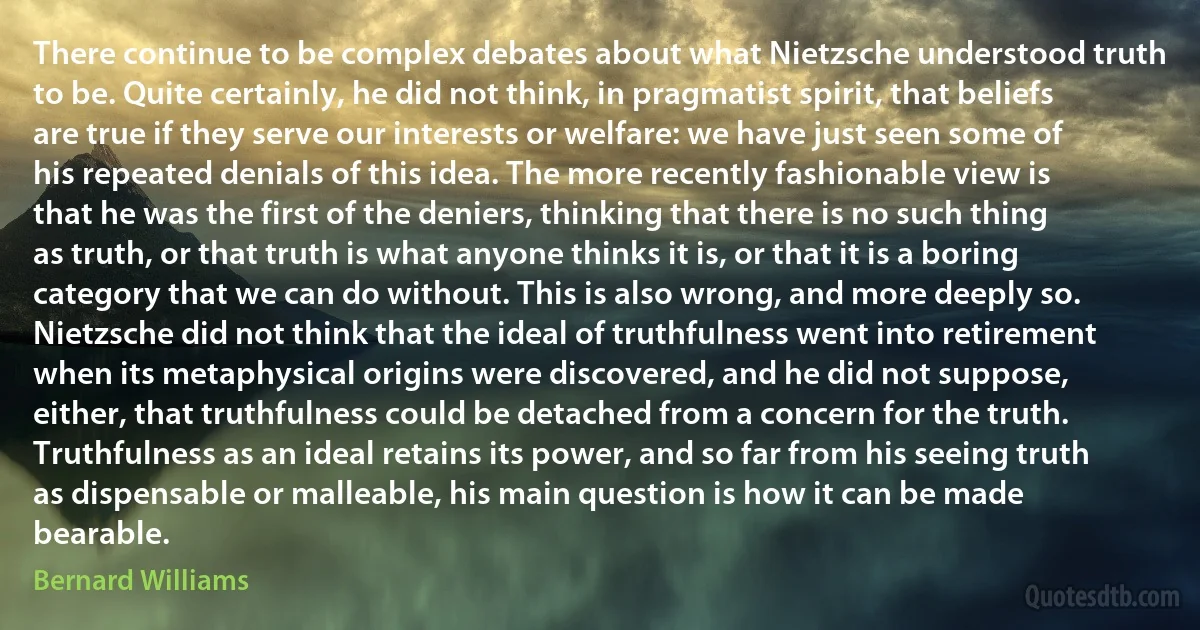
There continue to be complex debates about what Nietzsche understood truth to be. Quite certainly, he did not think, in pragmatist spirit, that beliefs are true if they serve our interests or welfare: we have just seen some of his repeated denials of this idea. The more recently fashionable view is that he was the first of the deniers, thinking that there is no such thing as truth, or that truth is what anyone thinks it is, or that it is a boring category that we can do without. This is also wrong, and more deeply so. Nietzsche did not think that the ideal of truthfulness went into retirement when its metaphysical origins were discovered, and he did not suppose, either, that truthfulness could be detached from a concern for the truth. Truthfulness as an ideal retains its power, and so far from his seeing truth as dispensable or malleable, his main question is how it can be made bearable.
Bernard WilliamsRelated topics
anyone category complex continue far went idea power pragmatist question quite retirement seen seeing serve spirit suppose thing thinking think truth view wrong nietzscheRelated quotes
But someone is bound to question ... by what right I regard as Ideological State Apparatuses, institutions which for the most part do not possess public status, but are quite simply private institutions. As a conscious Marxist, Gramsci already forestalled this objection in one sentence. The distinction between the public and the private is a distinction internal to bourgeois law, and valid in the (subordinate) domains in which bourgeois law exercises its ‘authority'. The domain of the State escapes it because the latter is ‘above the law': the State, which is the State of the ruling class, is neither public nor private; on the contrary, it is the precondition for any distinction between public and private. The same thing can be said from the starting-point of our State Ideological Apparatuses. It is unimportant whether the institutions in which they are realized are ‘public' or ‘private'. What matters is how they function.

Louis Althusser
Indeed, if any man can say, that it is not an interesting question, whether his existence terminate at death, or is to be resumed at a future period, and then to continue for ever, he must be of a low and abject mind. To a rational being, capable of contemplating the wonders of nature, and of investigating the laws of it, and to a being of a social disposition, his existence, and the continuance of his rational faculties, must be an object of unspeakable value to him; and consequently he must ardently wish that christianity... may be true. For to a philosopher, who forms his judgment by what he actually observes, the doctrine of soul, capable of subsisting and acting when the body is in the grave, will never give any satisfaction. To every person, therefore, who is capable of enjoying his existence, the christian doctrine of a resurrection opens a glorious and transporting prospect.

Joseph Priestley
Our presence will serve as an incentive for al Qaeda to grow in numbers and motivate more suicide bombers. An indefinite presence, whether in Iraq, Afghanistan, or Pakistan, will continue to drain our financial resources, undermine our national defense, demoralize our military and exacerbate our financial crisis. All this will be welcomed by Osama Bin Laden, just as he planned it. It's actually more than he had hoped for. [...] The war in Afghanistan and Pakistan will be much bigger, unless the dollar follows the path of the dollar-based world financial system and collapses into runaway inflation. In this case, the laws of economics and the realities of history will prove superior to the madness of maintaining a world empire financed by scraps of paper. Our military prowess, backed by a nuclear arsenal, will not suffice in overcoming the tragedy of a currency crisis. Soviet nukes did not preserve its empire or the communist economy.

Ron Paul
If you watch animals objectively for any length of time, you're driven to the conclusion that their main aim in life is to pass on their genes to the next generation. Most do so directly, by breeding. In the few examples that don't do so by design, they do it indirectly, by helping a relative with whom they share a great number of their genes. And in as much as the legacy that human beings pass on to the next generation is not only genetic but to a unique degree cultural, we do the same. So animals and ourselves, to continue the line, will endure all kinds of hardship, overcome all kinds of difficulties, and eventually the next generation appears. This albatross is over 30 years old, she's already a grandmother, and this year once again she has produced a chick. She will devote the next 10 months of her life looking after it. She has faced the trials of life and triumphed, for her little 2 day old chick the trials are just beginning.

David Attenborough
Children are made to learn bits of Shakespeare by heart, with the result that ever after they associate him with pedantic boredom. If they could meet him in the flesh, full of jollity and ale, they would be astonished, and if they had never heard of him before they might be led by his jollity to see what he had written. But if at school they had been inoculated against him, they will never be able to enjoy him. The same sort of thing applies to music lessons. Human beings have certain capacities for spontaneous enjoyment, but moralists and pedants possess themselves of the apparatus of these enjoyments, and having extracted what they consider the poison of pleasure they leave them dreary and dismal and devoid of everything that gives them value. Shakespeare did not write with a view to boring school-children; he wrote with a view to delighting his audiences. If he does not give you delight, you had better ignore him.

Bertrand Russell
